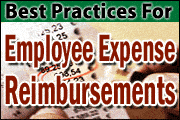Rules And Requirements For Employee Expense Reimbursements

Webinar: ID# 1000390
About This Course:
Certain reimbursements for employee expenses should be treated as expenses, while others should be treated as compensation. The trick is in knowing which is which!
If employee expense reimbursements do not meet IRS guidelines, they may be disallowed as expenses and considered compensation to those employees, leaving your organization responsible for the associated payroll taxes and any penalties.
The Requirements For Rules And Requirements For Employee Expense Reimbursements
The requirements for establishing rules and requirements for employee expense reimbursements typically involve several key considerations to ensure clarity, fairness, compliance, and efficiency. Here's a breakdown of these requirements:
- Legal and Regulatory Compliance: Ensure that the expense reimbursement policy adheres to all relevant local, state, and federal laws and regulations governing employee reimbursements. This includes tax laws, labor laws, and any industry-specific regulations.
- Transparency and Clarity: The policy should be written in clear, understandable language so that employees can easily comprehend their entitlements, obligations, and the reimbursement process.
- Eligible Expenses Definition: Clearly define what expenses are eligible for reimbursement and provide examples to avoid ambiguity. This definition should align with the company's objectives and industry standards.
- Documentation Standards: Establish clear requirements for the documentation needed to support expense reimbursement claims. This may include receipts, invoices, travel itineraries, and other relevant records. Specify acceptable formats and any additional information needed.
- Approval Processes: Define the procedures for obtaining approval for expenses before they are incurred. Outline who has the authority to approve expenses, the approval workflow, and any spending limits that require higher-level approval.
- Reimbursement Procedures: Detail the process for submitting expense reports, including the forms or software to be used, submission deadlines, and reimbursement timelines. Specify the method of reimbursement (e.g., direct deposit, check) and any currency conversion policies for international expenses.
- Spending Limits and Caps: Set clear spending limits for different expense categories to control costs. Specify any caps on individual expenses or aggregate expenses over a certain period. Communicate these limits to employees to prevent overspending.
- Record-Keeping Requirements: Establish protocols for retaining accurate records of reimbursed expenses for auditing and compliance purposes. Determine the retention period for expense documentation and the storage method (e.g., physical copies, electronic records).
- Training and Communication: Provide training to employees on the expense reimbursement policy, including its requirements, procedures, and any recent updates. Ensure ongoing communication to keep employees informed of any changes or reminders regarding the policy.
- Audit and Compliance Monitoring: Implement procedures for auditing expense reports to ensure compliance with the policy. Conduct regular reviews to identify any instances of non-compliance or potential misuse of funds. Take appropriate corrective actions as needed.
- Flexibility and Exceptions Handling: Allow for flexibility in certain situations, such as emergencies or business-related exceptions. Establish protocols for handling exceptions to the standard reimbursement policy and ensure consistency in decision-making.
- Ethical Considerations: Emphasize ethical behavior and integrity in expense reporting. Discourage fraudulent or unethical practices and provide channels for employees to report any concerns or suspected misconduct.
By addressing these requirements, organizations can develop comprehensive and effective rules and requirements for employee expense reimbursements that promote accountability, transparency, and compliance.
Learning Objectives:
This training session will help you to recognize - and accurately report - employee expense reimbursements. By attending, you will learn:
- Outline of the rules and requirements governing expense reimbursements, including best practices for Accountable Plans, Per Diems, and Advance Accounting
- Best practices for processing expense reimbursements either in payroll or accounts payable
- Per diems and advance accounting: when are they best used; how to account for them; when they become compensation versus an allowable business expense
- Recommended procedures for giving employees an advance prior to traveling
- Best Practices for processing employee expense reimbursements
...and as always, this session will be interactive, so we'll be able to answer your questions on this topic throughout the presentation!
Continuing Education Credits:
Click the 'Credits' tab above for information on PHR/SPHR, PDCs, and other CE credits offered by taking this course.


